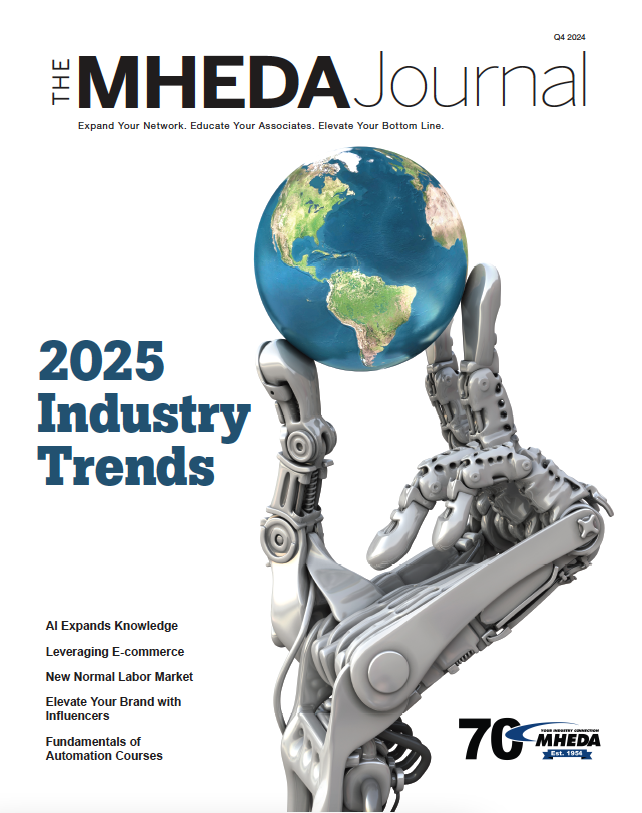MHEDA’s Updated 2020 Material Handling Business Trends
November 22, 2020
The following list of trends, in no specific ranking of importance, address the current shifting state of the Material Handling industry, as defined by a group of your peers, the MHEDA Executive Committee, during their annual meeting which took place virtually July 27-28, 2020. This meeting traditionally outlines trends for the year ahead. With the uncertain business climate, the committee opted to create a list of trends they believe will immediately impact the MHEDA Membership. We encourage you to discuss these topics with your own leadership team and look to MHEDA for resources to help your organization manage in the months ahead. MHEDA’s Executive Committee will review and update these trends at year-end as needed and will subsequently publish 2021 Trends.
Many of these trends specifically address challenges that all Member Companies are facing due to COVID-19 which demands immediate measures to prevent transmission within the workplace and requires clear policies, communication, training and education for all employees.
1.Leadership, Communication and Culture are Critical. Proactive communication with all employees, customers and partners, combined with leadership optimism is key. Now more than ever employees are looking for leaders that are creating a safe and flexible place to work. Member companies should find ways to continue providing premium service to customers, strengthen relationships with their suppliers and make meaningful contributions to their communities.
2.Economic Uncertainty: Member companies should be following certain key economic indicators to assist in their planning process. Member companies should be aware of and consider the management objectives suggested in MHEDA’s ITR report depending on their individual business cycle.
3.Cash is Critical: During these uncertain times, cash management and availability are paramount. Member companies should be focused on a cash flow forecast in order to maintain adequate liquidity and should be especially focused on these areas: capital spending, credit risks, collections, inventory turns and payments to partners.
4.Demonstrating Safety is Paramount. Member companies now have an opportunity to further solidify the relationship with their customers and employees by providing the safest possible environment and following proper protocol and CDC guidelines.
5.Employee Recruitment, Retention and Engagement is Critical. Having the right resources to assist employees with family responsibilities can be viewed as an opportunity for employee recruitment and retention. Member companies should consider developing plans and policies to address employee anxieties centered around the workplace and more complex personal responsibilities.
6.Diversity & Inclusion: Member companies can benefit by educating themselves on the topic of workplace diversity. MHEDA will continue to provide resources to positively address workplace diversity including gender, age and race.
7.Remote Work is Evolving. Member companies should consider increasing investments in technologies and processes to enhance the employees’ remote work experience while still protecting the security and effectiveness of the organization. 8.Continued Decrease of Face-to-Face Interaction. Elements of the sales/service process have shifted to a more digital format with limited face-to-face interaction often due to the disparity of regional governments’ responses and guidelines. It is critical for Member companies to understand and embrace these processes and have the ability to utilize corresponding electronic communication, software and tracking tools.
9.Acceleration of Automation Solutions: Customers’ plans to add and/or enhance their automation capabilities have been accelerated due to direct to consumer demands and labor challenges. This is a significant business opportunity for Member companies to provide automated solutions.
10.Consolidation Opportunities: As consolidation opportunities accelerate in the current economic environment, owners should consider different strategies for the future of their business depending on their desire to sell, acquire or better position their company.
11.Business Interruption Planning: To mitigate the risk of future business interruptions, Member companies may need to modify their existing disaster recovery plan to address other possible risks including a future pandemic.
Note: There continues to be ongoing important business issues that members need to recognize and consider including insurance, the demand for skilled labor, regulatory policies, trade/tariffs, cyber security, etc.






